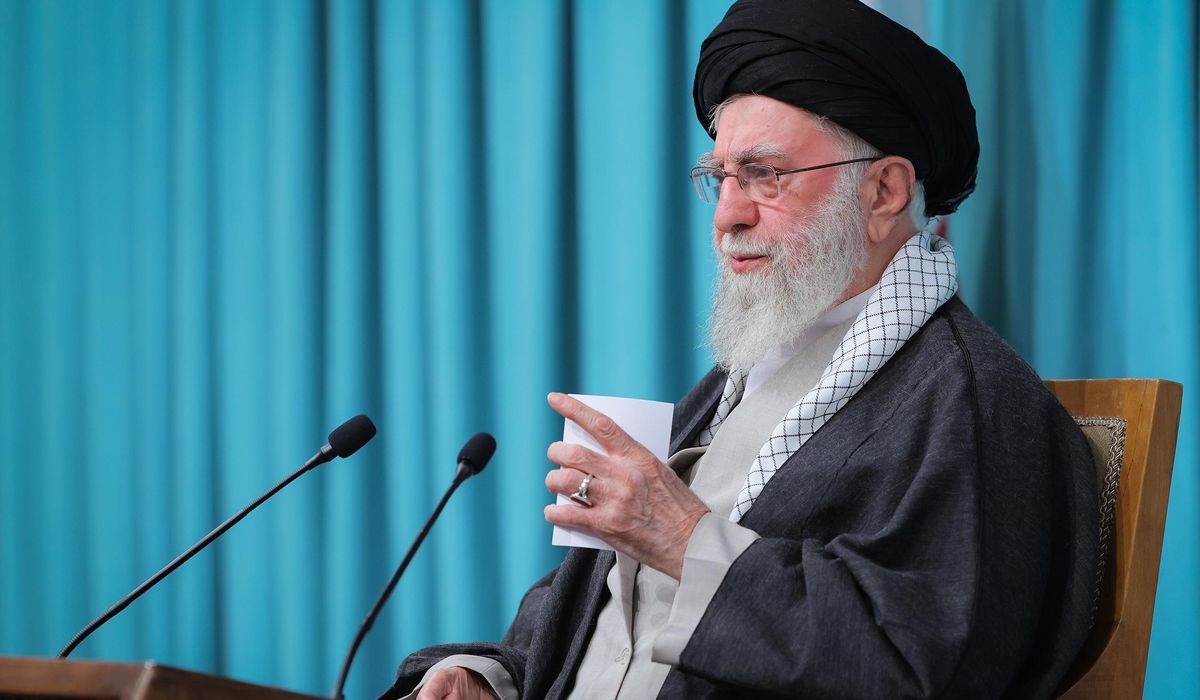


VIENNA — Iran’s supreme leader on Tuesday rejected direct negotiations with the United States over his country’s nuclear program, likely slamming the door shut on a last-ditch effort to halt the reimposition of United Nations sanctions on Tehran.
Ayatollah Ali Khamenei’s remarks, aired on Iranian state television, likely constrain any possible outreach to the U.S. by Iranian President Masoud Pezeshkian, who is in New York for the U.N. General Assembly. Separately, Iranian Foreign Minister Abbas Araghchi held meetings there with diplomats from France, Germany and Britain over the reimposition of the sanctions, set to take effect Sunday.
Talks with the U.S. represent “a sheer dead end,” Mr. Khamenei said.
“The U.S. has announced result of the talks in advance,” he added. “The result is the closure of nuclear activities and enrichment. This is not a negotiation. It is a diktat, an imposition.”
The German Foreign Office, in comments posted on X after the meeting with Mr. Araghchi, said France, Germany, Britain and the European Union urged Iran to take steps within days, “if not hours,” to address concerns over its nuclear program. It should resume direct talks with the U.S. and provide the International Atomic Energy Agency with access to all its nuclear sites, ”in line with its obligations,” the statement said.
The three European countries, known as the E3, triggered the snapback” mechanism to reinstate sanctions — barring a last-minute accord — over Iran’s failure to comply with conditions of the 2015 nuclear deal aimed at preventing Tehran from developing nuclear weapons.
The meeting Tuesday did not appear to move closer to a resolution before Saturday’s deadline. But a French diplomat said the European leaders plan to make “full use” of the remaining time. The diplomat spoke on the condition of anonymity because they were not authorized to publicly discuss the private meeting.
The German Foreign Office said “diplomatic engagement” would continue even if sanctions are reimposed Sunday.
Earlier, Germany’s Foreign Minister Johann Wadephul had described the chance of reaching an agreement with Iran by the weekend “extremely slim,” the Germany news agency dpa had reported, even before Mr. Khamenei’s comments.
Amid a flurry of diplomatic engagements, Mr. Araghchi on Monday also met with Rafael Grossi, the IAEA director-general, in New York.
The U.N. nuclear watchdog and Iran this month signed an agreement mediated by Egypt to pave the way for resuming cooperation, including on ways of relaunching inspections of Iran’s nuclear facilities. However, that agreement has yet to fully take hold.
In July, Mr. Pezeshkian signed a law adopted by his country’s parliament suspending all cooperation with the U.N. nuclear watchdog. That followed Israel’s 12-day war with Iran in June, during which Israel and the U.S. bombed Iranian nuclear sites.
France, Germany and the U.K. began the process of reimposing sanctions on Iran at the end of August.
The process — termed a “snapback” by the diplomats who negotiated it into Iran’s 2015 nuclear deal with world powers — was designed to be veto-proof at the U.N. It started a 30-day clock ticking for the resumption of sanctions unless the West and Iran reach a diplomatic agreement.
European nations have said they would be willing to extend the deadline if Iran resumes direct negotiations with the U.S. over its nuclear program, allows U.N. nuclear inspectors access to its nuclear sites, and accounts for the more than 880 pounds of highly enriched uranium the U.N. watchdog says it has. Iran is the only nation in the world that enriches uranium up to 60%, a short, technical step from weapons-grade levels, that does not have a weapons program.
If no diplomatic deal is found this week, the sanctions would automatically “snapback” on Sunday. That would again freeze Iranian assets abroad, halt arms deals with Tehran and penalize any development of Iran’s ballistic missile program, among other measures, further squeezing the country’s reeling economy.
